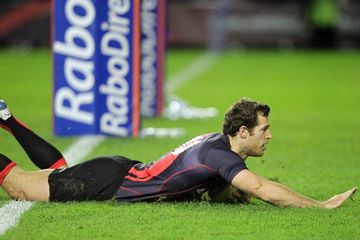What's more, Visser has scored them in almost half the time, from 60 starts compared to Bowe's 100-plus for his native province and the Ospreys.
Scotland's newly-capped wing marked his first appearance as an international with all three Edinburgh tries against Munster at Thomond Park, even if they were not enough any more than a losing bonus point.
Hat-tricks by opposing players in Limerick may be few and far between but they are rapidly becoming a Scottish speciality.
Stuart Hogg, capped last season at the age of 19, accounted for all three Glasgow tries when the Warriors gave Munster a serious run for their money last April on their way to the play-offs.
In repeating the feat, Visser could scarcely have given the rest of the RaboDirect PRO12 a more emphatic reminder of his status as the league's supreme finisher.
Leading scorer last season (13 tries from 19 matches) and the season before (14 from 21), the 25-year-old Dutchman who qualified for Scotland on the three-year residency rule may still have to go some to secure an unprecedented hat-trick for finishing top of the pile three years on the run.
George North, for one, intends to push him all the way. The prospective Lion from Anglesey has scored five from the Scarlets' four matches in marked contrast to last season when he drew a blank from a domestic campaign truncated by international demands.
Another wing, Glasgow's DTH van der Merwe, has also come blasting out of the blocks with two tries from each of the Warriors' last two wins, against the Ospreys in Swansea and Connacht at Scotstoun.
With Dan Evans also claiming four for the Dragons, the figures add up to more tries per game. The first four rounds have averaged as near four tries per match as makes no difference, compared with a figure of fractionally fewer than three over the same period last season.
Nobody will be surprised should Visser add at least one more to his collection when Edinburgh run out at Rodney Parade on Friday night, having been rested for last weekend's defeat to Leinster.
Bowe was not in action either last weekend following the postponement of Ulster's scheduled match against Zebre in Italy following the family farm tragedy in which Nevin Spence died along with his father, Noel, and older brother Graham.
In a short time the youngest of the trio had achieved enough to suggest that he was an Ireland centre in the making.
Ulster captain Johann Muller paid tribute to 'a highly skilful and gifted player. He was utterly committed to Ulster and enorously proud to represent his Province. His positive outlook on life brought a smile to people's faces. He was kind, polite, generous and courageous and we were blessed to have him in our team.'
Rugby has had to endure its share of premature deaths caused by tragedies like the terrible accident at the Spence farm in Co. Down. Raph Tsagane had begun to make a name for himself on the wing for Wasps when he was killed at the age of 19 in a car crash during the club's Easter tour of Merseyside in April 1990.
That was back in the amateur days when Wasps played at Repton Avenue in north London, their team reinforced by England players like Jeff Probyn, Paul Rendall, Steve Bates, Rob Andrew, Mark Bailey, Rob Lozowski, Fran Clough, Simon Smith and another wing famous for his hat-trick against Ireland at Twickenham, Chris Oti.
A fortnight or so after the Tsagane tragedy, Wasps clinched their first English title, seizing what was then the Courage League on a day when Gloucester blew the title by losing 12-3 at Nottingham whose pack then featured Brian Moore and Gary Rees of England as well as the Scotland lock, Chris Gray.
Nick Duncombe had made one start at scrum-half for Harlequins, against Northampton at The Stoop on January 26, 2001, when England chose him in their 22 against Scotland at Murrayfield seven days later. Injury to Kyran Bracken meant the new boy played the entire second half as if to the manor born as England cruised home 29-3.
A fortnight later, after a second outing for Harlequins, Duncombe made his Twickenham bow during the closing minutes of a 45-11 win over Ireland. Sir Clive Woodward described him as 'one of the brightest and most talented players in the game. His first two caps would, I believe, have been the beginning of a long international career.'
Duncombe passed away 12 months after bursting onto the international stage from nowhere. News of his death, from a rare illness, coincided with England starting their 2003 Grand Slam campaign against France at Twickenham.
Among other internationals whose lives were cut cruelly short, four spring to mind. Nicky Allen, an All Black stand-off who made nine appearances during the early Eighties, died at the age of 26 from head injuries received during a club match in Australia in October 1984.
Martin Knight, capped by Australia in 1978 when the Wallabies won both Tests against the Grand Slam Welsh, also died in 1984, at the age of 28 after a four-year battle against leukaemia.
Alexander Obolensky was a 20-year Russian prince who electrified Twickenham with two tries on debut against the All Blacks in January 1936. His was truly the stuff of legend even if Obolensky never scored another try in an England career limited to four matches. He was killed four years later in a flying accident during training with the RAF.
Sam Doble, Moseley's prolific goalkicker, made a winning debut for England against South Africa at Ellis Park, Johannesburg in 1972. He made two more appearances and died from cancer five years later at the age of 33.














